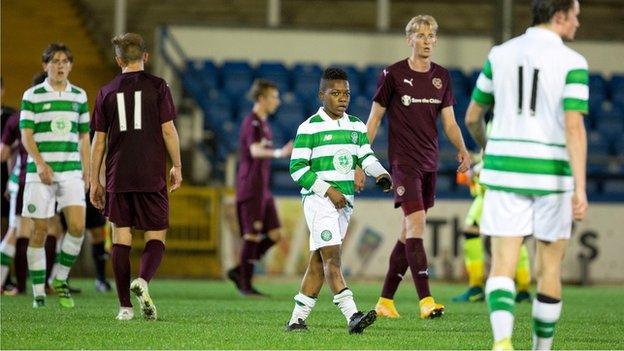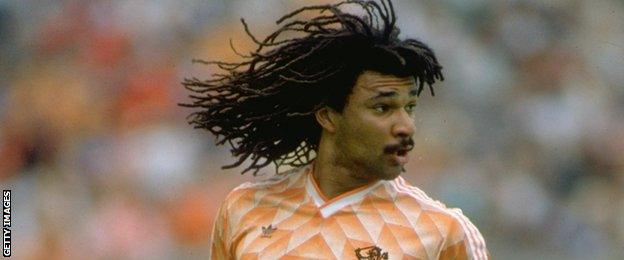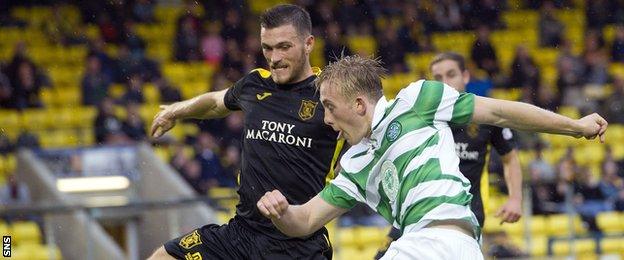'Karamako Dembele brilliance should be allowed to flourish'
- Published

Karamoko Dembele played for Celtic under-20s on Monday
Happy days for Celtic; they wait a long time for one Dembele and then two come along almost at once.
Moussa is a magnificent tyro at 20, a young man who in the space of a week scored two Champions League goals against Manchester City and one international goal on his debut for France's under-21s and yet, despite all of that, was still over shadowed by his namesake, Karamako.
Thirteen-years-young, Karamoko almost broke the internet over the last few days. OK, not quite, but the reaction to his nine-minute appearance for Celtic's under-20s against Hearts on Monday night was worldwide.
If you search his name using Google you get "about 551,000" items. When you look at the YouTube clips of him playing there have already been nearly 400,000 views on one video, nearly 90,000 on another, more than 60,000 on another and tens of thousands of other hits on various websites around the globe, all showing his dynamic running.
There is a mesmeric quality to him, a mystique as to how he ended up at Celtic and not Barcelona, where these boy wonders usually hail from.
Many media outlets fell over each other to give you the lowdown. Ruud Gullit expressed his astonishment, external at his ability. A former coach compared him, inevitably, to Lionel Messi. Another gushed that little Karamoko could do 100 keepy-uppies from the age of five.

Guillit has been impressed by Karamoko Dembele
Ladbrokes went with the flow. As sponsor of the SPFL they should have known better, but people were driven to distraction by the young man and the bookmakers sought to tap into the hype.
However, the firm apologised and closed the book on him having taken no bets.
They offered a range of odds on what Karamoko was going to do next and when he was going to do it - his first team debut for Celtic, his chances of becoming Celtic captain, the likelihood of him scoring more goals than Henrik Larsson or, if you preferred, the chances of him being signed by Barcelona.
The hoopla - so to speak - was moving as fast as the wee man's legs. There's good in this. The boy gets a shot at a much higher level, if only for nine minutes. He's sent a message by his club that they will not hesitate to give him opportunities when the time is right. He's now on the radar of the Scotland international team. That's good, too. For him, for Celtic, for Scotland.
His family get to see their son admired all over the world - and who knows what that might lead to down the line. Maybe nothing, but every big club in Europe will now know of this kid, if they did not know about him already.
Celtic have the feel-good factor of having a boy of great potential. And by giving him those nine minutes, they send a reminder to parents who might be wondering where to send their own child prodigy that the club's academy is the kind of place that nurtures youth and gives youth a chance.
These things tend to sprout legs, though. One minute everybody is marvelling at the natural ability of this lad, the next minute everybody is checking themselves and saying 'Let's not be daft about this, he's only 13' and the minute after that, things get really heavy.
A celebration of a young talent morphs into a debate about the exploitation of children by professional football clubs. Tam Baillie, Scotland's children's commissioner, appeared on Good Morning Scotland on Thursday with some particularly serious comments.
He spoke about the "commodification" of young footballers. In light of Ladbrokes' novelty bets on the future of a 13-year-old, Baillie had a point. He went on to paint a grim picture. It's one he's been painting for a long time.

Celtic Under-20s played in the early rounds of this season's Challenge Cup
He spoke about 15-year-olds being held to contracts against their will, he mentioned reports of a "transfer market in children" and followed up by saying that football authorities in Scotland are "not capable of or not willing to exert sufficient regulation for the protection of our children".
That's a fairly thunderous accusation. The Scottish FA and Scottish Professional Football League said on Thursday night that they were "surprised" at Baillie's comments. Livid would be a more accurate description.
They pointed to the progress that's been made in recent times. The working party set up to examine youth football in Scotland. The changes implemented on the back of a Youth Football in Scotland petition. The appointment, by the SFA, of a Children's Safeguarding and Wellbeing Manager "to ensure that the rights of the child are at the heart of all decisions relating to young football in Scotland". The implementation of a complaints and mediation mechanism - the Young Players' Wellbeing Panel.
That's the vehicle by which Baillie can raise concerns. "If the commissioner has any evidence that could lead to a breach of regulations we would expect to have received communication from him," wrote the SFA and SPFL in their statement of Thursday evening. "To date, none has been forthcoming."
Allegations of a transfer market in kids and of the football bodies ignoring that transfer market is serious stuff. Big allegations demand big evidence, though. Baillie says he has provided it. The football authorities say otherwise. They say they have created the mechanism for him to raise a red flag on anything he does not like and that in the last year, since the working group was created, there has been no red flag.
You would hope, and assume, that young Karamako is oblivious to all of this. You would hope, above all, that he carries on loving his football and playing it with the elan that is so gloriously obvious in the few clips we have seen of him.
Football is a complicated and brutal business, but occasionally it's beautiful, none more so than when you see this kid slaloming through defences with a smile on his face.
Brilliant innocence. Hell mend the person who takes it from him.
BBC Scotland's Richard Wilson on registration rules |
|---|
As it stands, the registrations of players from the age of 10 to 14 lapse at the end of each season, allowing the club and the individual the opportunity to renew or not. Between 15 and 17, the decision to extend the registration or not lies solely with the club. The players must receive a certain amount of game time, though, and can also choose to return to recreational football. They cannot sign professional contracts until they reach school-leaving age |
If a youth player chooses to leave before 15, or after turning professional, a compensation fee is due for training costs. This is based on a matrix of factors, including the status of the training club's academy (bronze 1 or 2, silver, gold or platinum) and the players' age at the time he was at the training club. For training costs to apply, the training club must also have made an offer of a further period of registration to the player |
For example, each year a player spends at a platinum academy from 11-13 would generate £7,500 in compensation, while from 14 to 19, each year would generate £15,000 in compensation. |
The system is designed to prevent players being swept up by big clubs in Scotland, and also clubs in England. The Scottish Football Association also employ a full-time Child Protection and Safeguarding Manager to monitor and protect the wellbeing and rights of youth footballers within Club Academy Scotland |